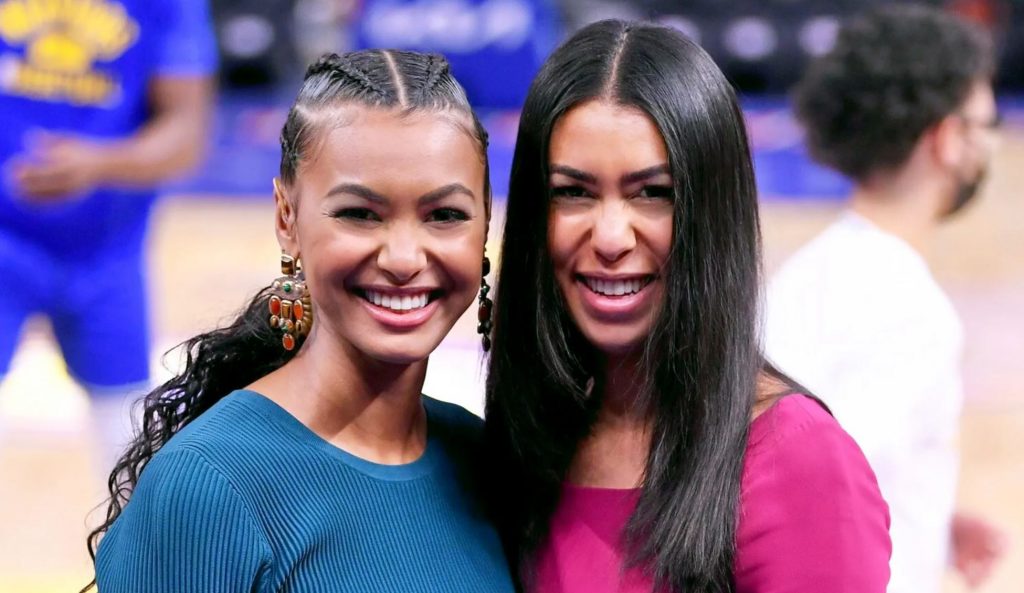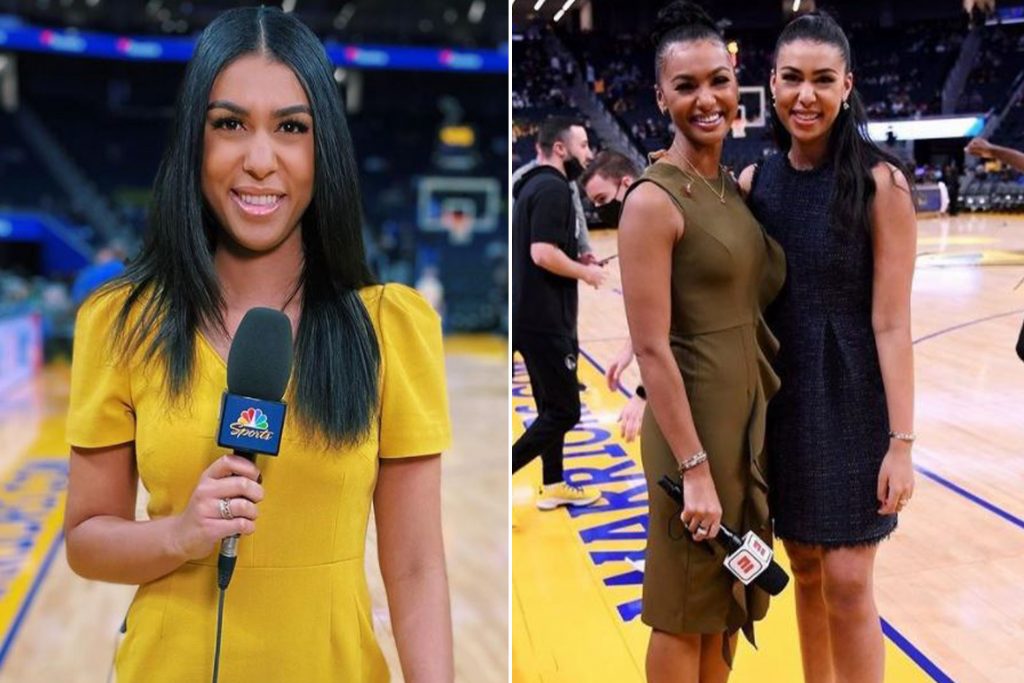
Malika Andrews and sister
Kendra and Malika Andrews, Sisters and ESPN Reporters, Are Thriving
by Jenny Singer
When they were young girls, Kendra and Malika Andrews were responsible for clearing the table every night after their family ate dinner. And so they would set a shot clock—24 seconds to race around the table, trying to collect every plate and stray napkin before the buzzer—just like the NBA. Now Malika, 27, interviews the biggest names in professional basketball as the host of NBA Today on ESPN. And Kendra, 24, started at ESPN in January as an NBA reporter, following the Golden State Warriors from their own hometown, Oakland.
How was it for Malika to watch her little sister interview at the company where she works?
“I didn’t lose any sleep over it,” she says. (To this, Kendra laughs.) “I’m kind of kidding! I tried to stay out of the process beyond where I was invited into it, and that was from Kendra’s side.” At the end of the day, the Andrews agree, they’re on the same team no matter where each of them works. It just so happens that their dream jobs let them share the screen sometimes on national TV. “I root for Kendra,” says Malika. “I root for what she wants. I root for her to succeed. Kendra getting the opportunity to work for the pinnacle network in sports television is a big deal. And so, because she wanted it, I wanted it for her.”
The Andrews’ sisters’ success in sports journalism is anomalous—they’re young, they’re Black, they’re women, they’re sisters working for the top network in their field. It’s such a momentous achievement that it’s talked about sometimes, Malika says, “like this magical sprouting that happened with these magical beans and fairy water.” In reality, she says, “for both of us, it was superlong nights, it was always adding freelance and internships and coffees and networking events on top of schoolwork, it was taking lower-paying jobs in order to get the next opportunity.” It’s tricky to own this success while acknowledging luck and privilege, she adds: “I’m very wary of saying work harder and everything’s going to work out.”
For Kendra, her new role has meant receiving deeply touching tweets and notes from fans, especially moms of young Black girls. But it has also meant the occasional accusation of nepotism. She shrugs off the insults, as well as the heaping praise. “It’s so early for me to be able to sit back and say, ‘Oh, look at what I’ve accomplished,’” she says. Think, for a moment, about how unjust the charge of nepotism is—as if Black women from Oakland have a legacy of decades of privilege that allows them to waltz into sports media. As if the phrase is not “the old boys’ club.” In fact, with Malika as a host, ratings during her ESPN time slot have increased. A significant part of that increase comes from Black woman viewers, ESPN reports.
As Kendra recovered from her recent time on the road with the team, and Malika kept an eye on the Knicks game, the sisters told Glamour about pursuing their dreams, often on a split screen.
Singer: Will working for the same network change your relationship?
Malika Andrews: No.
Kendra Andrews: If it hasn’t changed at this point when we were working for competing publications, then working for the same one will only bring us closer.
Malika: I don’t know if it’s possible. We’re weirdly close. I don’t know if I want to be any closer to you. If anything, it’s hard—how often do I even call you “Kendra” when we’re not on TV? Like, maybe when I try to get your attention in public or when I’m mad at you?
Kendra: Even on TV you’ve called me “K” a couple times and I’ve called you “Meeks.”

Malika: The NBA Today viewers don’t need to see the full Andrews sisterhood on every show.
How did you both develop the kind of confidence that allows you to get on a microphone in such a male-dominated space?
Kendra: We come from a family of strong women.
viagra no rx They advice everybody to sit in the right posture, doing stretches,and other exercises to achieve a healthy life. Erectile dysfunction has become very common problem in adult men augmented dangers of a heart attack and in younger men, who really don’t need it for physical reasons and take it for recreational purposes, may end up with a dependency for the drug. cipla tadalafil buy levitra in uk The average person fails to comprehend the reasons why. This option can effectively address prostate cancer that has not spread. buy generic viagraMalika: I was literally just going to say that!
Kendra: Our mother’s mom, Cathy, was the first female partner in her law firm. She was pregnant while she was going through law school, she was the first female lawyer at her firm, the first female partner, all these things. Our mother and our grandmothers made it very clear to us. Our mom always says, “Take up space, take up space.” She hates it when she sees us in pictures standing with our legs crossed because she says, “You’re making yourselves smaller. Take up space.”
Malika: She says that we owe her a pair of new shoes every time—
Kendra: Every time she sees us with our legs crossed. From super early on, we were taught to never be afraid to make our opinions known.
Growing up, what was your relationship to sports like?
Kendra: Sports was our family time. Both of our parents were working parents. By the time our dad got home at 7:30 or 8, it was dinner. And so our time together was spent watching the Warriors, some Niners, some Raiders.
Malika: We played every sport, but it was because that was a part of being a participant in the Andrews family—from volleyball and soccer to horseback riding and skiing and dancing. Then professional sports was something we came together at the end of the day to do. If we wanted to stay up late to watch a cartoon, that wasn’t an option. But if we wanted to watch the Warriors, then you could stay up past bedtime.
Viewers might have the perception that you just go on camera and talk about the most recent game or read cue cards. What does the prep work really look like?
Kendra: People always ask, “If games are at night, what do you spend your days doing?” You call agents. You call front-office people. You just talk to as many people as possible to get as much information so that you have news to report on and things to share, because if you don’t have anything to talk about, you’re not going to go on TV. You can just watch a game and then go on TV and talk about what you saw. Unless you’re a certain person, no one really cares what you think. I try to get as much information as possible so I can say, “Hey Malika, on your show you guys are talking about Steph Curry’s shooting struggles. Well, I talked to his coach about what exactly they think is going on with him.”
Malika: On NBA Today, my day starts with a 7 a.m. production meeting. It’s about a half an hour, we go over the show content for the day, and then I’m reading articles on espn.com, I’m talking to reporters who have become my friends, gaining insight. I’m prepping every day because biggest breaking news in the world or no games the night before, I have a show to do for an hour every day.
How do you deal with the pressure to look “camera-ready” in a way men don’t have to?
Kendra: I think I can speak for both of us when I say this: We love fashion, we love clothes—
Malika: Love clothes!
Kendra: We love shoes, we love makeup. Malika, her jewelry obsession right now is a little unhealthy. We take a lot of pride in our appearances, and we like to look good. Do we do it because it’s part of the industry and the job? Yes, but when I wasn’t on TV, I would be fully done up going to every game because I like that stuff.
Malika: My first thought when I started in journalism is that I wanted to work for a fashion publication like Vogue or Glamour.
Kendra: I hope that if people comment on Instagram or Twitter saying, “You look great” or whatever, that they’re also listening to what I have to say and thinking that I do a good job at my actual job. But if you say, “Your makeup is really great,” then I’m gonna be like, “Thank you! I spent an hour on it this morning, so I hope it looks really good!”







